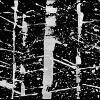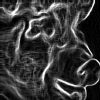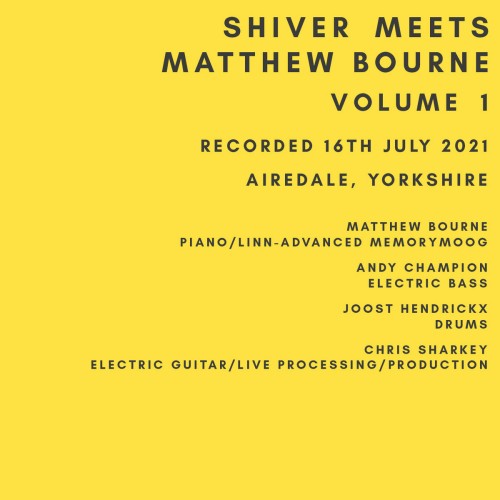Jackie O Motherfucker – Change
Label: Textile Format: CD,LP
The first time I heard the CD I fell asleep around the end of “Bus Stop”, the fifth track, and that’s not a meant to be a negative response to the music. It just has a strangely lulling quality about it. There is a lo-fi feel to this track which combines a range of instruments in a rising/falling, open-ended jam. I like this way of taking the collective noises and exploring them in what feels like a “live” context. Some vocals briefly surface from beneath the drones and unfolding patterns but they seem to have wondered in from another time and place. Maybe that’s the idea.
Their “Feast Of The Mau Mau” , is another track which I half dreamed my way through as the gristly tenor sax and muted but powerful drums slugged it out with other assorted noises from guitar and whatever else is to hand. It is a dark primal brew and the sax is particularly insistent. Jackie O Motherfucker, or JOMF, as one faint-hearted Radio 3 person recently preferred to call them, don’t easily fall into any one category. From these spacey excursions they gravitate to the banjo and guitar, back porch ambience and, frankly, fairly tuneless vocalising of the opener, “Everyday”. For me, they are at their most interesting on pieces like, “777”, which accommodates a range of instrumental colours created by sax, cello, violin, percussion and is nothing like the first track. Free improvising and a “let’s see where this takes us” approach is evident and if at times it sounds a little shambolic it’s alright because it still manages to surprise you.
The wonderfully titled, “Fantasy Hay Co-op” is another example that’s worth hearing as it explores dense, shape-shifting layers of sound. This is music that has no real beginning or end and, in one sense of the word, is truly timeless.
-Paul Donnelly-
David Jackman – Flag Of Silence
Label: Die Stadt Format: 7″
Aron’s Records buyer Gregor Meyer had this to say: “Two outstanding drones from Organum’s Jackman. The a-side is unreleased while the b-side is from an extremely limited (only 10 copies) cassette from ’84. This 7″is limited to only 100 copies.” Hm.
The a-side: a distinct cadence of rumbles emerges, and the sounds seem more synthetic than side-b. It would be interesting to know how the sounds were created, but there are three chances of finding out – slim, fat, and none. Each sound (of which there are several) seems to have its own mood – to BE its own mood – and is there a natural urge to separate sounds from movements like these – that you identify with personally? Now at 45rpm. Does speed more clearly reveal underlying sound, the faster something is played? Is the impact of such a piece lessened or strengthened depending on that speed? This side, more than the b-, changes into an entirely different animal at the faster speed. It would be interesting to somehow create a piece whose sounds leak from Side A to Side B… but for now – has this record come close?
There seems to be plenty going on in the b-side, besides – and yes, a grinding is apparent. But – “drones” are a bit underestimable of the sounds on this piece. In fact, at times, the foreground and background sounds jockey for first place. The end sounds are reminiscent of a machine winding down. Keep in mind, these are the sounds played at 33rpm. Now at 45rpm – seemingly the sound of clarion calls, with no clearly evident rhythmic pattern. One of the nice things about people who don’t include any technical information on their releases – you can “play” it any way you like (including destroying it entirely), and who’s to say it’s “wrong”?
(Available from Jochen Schwarz, Vor dem Steintor 218, 28203 Bremen, Germany; +49 421 75993 fax).
-David Cotner-
David Jackman – Gun, Machine, Vickers, .303-inch, Mk 1
Label: Robot Format: 7″
OHHHHHHHHHHHH what a rush.
I mean, this is pure fucking rock. Two Tommies man their maschine gun – as indicated by title and photo (pos/neg) – and that’s what you hear. There are some slight panning differences from side A to side B – but it’s a maschine gun. Whither goeth the lock groove? That’s the only thing that’s missing from this. Limited to 385 or so, depending on whom you believe at eBay.
I hope the maggots realise the sheer genius they’re chowing down on when they get to David Jackman.
-David Cotner-
Mahalia Jackson
– Mahalia Jackson In Concert Easter Sunday, 1967
– Sunday Morning Prayer Meeting With Mahalia Jackson
– Recorded Live In Europe During Her Latest Concert Tour
Label: Columbia Format: CD
 Mahalia Jackson sang Gospel the way (and the only way) I really care to hear it – a strong, lone voice with minimal musical accompaniment and no electric guitars. These three new CDs cover a good deal of her live and previously-unreleased material, which might make one wonder if it’s the sort of unreleased material that should have stayed so, but in this case, pretty much anything Jackson sang, including badly-taped shower songs, is worth releasing.
Mahalia Jackson sang Gospel the way (and the only way) I really care to hear it – a strong, lone voice with minimal musical accompaniment and no electric guitars. These three new CDs cover a good deal of her live and previously-unreleased material, which might make one wonder if it’s the sort of unreleased material that should have stayed so, but in this case, pretty much anything Jackson sang, including badly-taped shower songs, is worth releasing.
…In Concert Easter Sunday, 1967 is a live collection of more traditional Gospel songs, including “Thy Will Be Done,” “In My Home Over There,” and her stand-out rendition on “Come On Children, Let’s Sing,” which conveys such strength and joy that it’s hard to picture the somber crowd of New York’s Philharmonic crowd being able to sit still through the performance. Sunday Morning Prayer Meeting With Mahalia is more subdued, a stripped-down collection of songs from various sources (both live recordings and from previous Jackson albums) that sound more earthy and closer to the Blues than Gospel, despite the religious lyrics.
The third album Recorded Live in Europe During Her Latest Concert Tour, is essentially a selection of live recordings from Jackson’s 1961-1962 extensive tour of Europe. Much of the material on this album can also be found on the previously mentioned records – only difference is these are the live versions of the songs, and nowhere can Jackson’s strong personality and wonderful adlibbing style be heard than on her live recordings. While it’s often been said that Jackson was America’s greatest gospel singer during her day, it’s obvious from these recordings that she was so much more and deserves attention from anyone who appreciates the power of a beautiful voice.
-Holly Day-
Jaga Jazzist – A Livingroom Hush
Label: Smalltown Supersound Format: CD
Okay, any website that has four pop-up windows when you first log on to it has to die. Very bad, guys.
The music itself? Frenetic, Drumnbass bees divebombing into a cloud of Jazzist horns and dulcet tones, into a chocolate cheesecake melange of smooth downbeat Jazz. It creeps around corners and creiks down the staircase in a very “magic hour” sort of way – it’s fine for afternoon slow dancing as the sun slants through the slats of the blinds and your cat moves in accordance with the waning of the day. Back through the clouds of bees now – clattering with their warbling organ tones and chattering amongst themselves with the rapid rate of the high-hat. The final piece, “Cinematic”, explores the same guitared tones and twilight spaces again and again, flowing to the horizon in resplendence and not looking back at what has come before
It’s smooth, clean, serviceable and workmanlike modern fuck music Jazz. Hey now!
-David Cotner-
Jailhouse – These Foolish Strings
Label: Meeuw Format: 7″
Another release from the label that features the most hallucinatory hues of coloured vinyl this side of Albert Hoffman‘s house. This time out: marvy magenta. The thud of percussions slumps playfully across the pop and crackles. A tuneful ditty burbles by. Voices possibly call out – the return of the aural rorschach? Those foolish strings twinkle around more synthetics and the off-time drummer. Jaw’s harp redux in cheap unstable interstellar prison. Alas – too soon, too soon…
-David Cotner-
Jane’s Addiction– Kettle Whistle
Label: Warner Brothers Format: CD
I have heard the phrase “I thought I’d died and gone to heaven” dozens of times. And each time I hear it, I think “what are they on about?” I mean, if there is such a thing as heaven, you can be sure as shit that nobody can even imagine whatit’s like… let alone think they’re there. At least, that’s what I used to think. Now, when someone says “I thought I’d died and gone to heaven”, I’ll assume they actually mean “I’ve just listened to Kettle Whistle by Jane’s Addiction“. Because, if there is a heaven; I know – for a fact – that Kettle Whistle will be an integral part of the aural experience of the Divine.
Two months prior to the release of Kettle Whistle an announcement was made. Jane’s Addiction had reformed (or, indeed, relapsed). There’d be tours, new albums, ooohhh all manner of wonderfulness would be forthcoming. Then… well, then nothing. In hushed tones the American tour was discussed and plans were hatched to sell body-parts in an attempt to see them play live in New York or San Francisco (hell! Fife, Alabama would have sufficed!). Suddenly, the proposed European tour was scrapped. Then plans for a follow-up to the still-as-yet-unreleased Kettle Whistle were dropped. It all started to appear like some kind of bad joke played by Warner Brothers (or perhaps by Perry himself as a reaction against the commercialisation of Lollapalooza?). Who knew? All I knew was that the rumours faded into the background and I resigned myself to reading sometime in March next year that Kettle Whistle had been shelved.
But on December 1st 1997, Kettle Whistle hit the shops. I had my usual “Fifteen quid for four new tracks and a bunch of live / demo versions of songs I already own” dilemma. But that lasted all of ten seconds (the time it took to pick up the CD and walk to the counter to pay) and I reflected that I had – after all – bought all three Beatles Anthologies and didn’t regret any of them. Within minutes of buying the album, I got a call from a friend enthusing wildly about “the best version of ‘Jane Says’ ever! And just wait ’til you hear ‘My Cat’s Name Is Maceo’… it’s brilliant, in a kind of jazz way”. So, the rest of the nation was also being all enthusiastic about this release (or, at least, that’s how it seemed when I got a second phonecall just to rave about Kettle Whistle… and I had still not managed to listen to the thing yet). Then I listened to it.
The album opens with the first new track… called – oddly enough – ‘Kettle Whistle’. Despite thinking about this review for over an hour now, I’ve still failed to unearth any adjectives that adequately describe this song. You know that bit on the live album when the drums suddenly resolve themselves into the familiar pattern of ‘Sympathy’ and shivers race down your spine? The entire first track is like that. Perry’s voice crackles with emotion and soars to places that most singers would deny even exist; and all the while you’ve got these incredible drums urgently forcing the song towards a conclusion, topped with the sort of guitarflourishes that you just know Jason Spaceman would fall in love with. Emotionally intense and technically flawless all at once. Then, all of a sudden, a demo version of ‘Ocean Size’ roars out of your speakers and you are almost literally forced to turn the volume up to eviction levels and scream along with the ecstasy of guitars. I’m not going to start comparing versions of songs. I’m not going to say “oh, this version is better than that version”. All I’ll say is that the versions of familiar songs on Kettle Whistle are more than good enough to justify buying this album without the new tracks. I shit you not. You do not need to be a completist to get Kettle Whistle.
I shall now blatantly contradict the previous paragraph. The version of ‘Jane Says’ on the new album is the greatest version you will ever hear (unless you do get the chance to see them live). Perry Farrell has a voice that simultaneously impels you towards despair whilst demanding you look upon the faces of the gods. If the live album didn’t convince you that Jane’s Addiction are/were the finest live band in the world, then Kettle Whistle will. It’s that simple. It is also a tragedy of biblical proportions that they didn’t tour Europe on the back of this album. I could go on, but brevity is the soul of something or other.The new track ‘So What!’ is the low point of the album for me. But as low points go, it kind of rocks. I mean, it shits over the high points of most albums you’ll hear. ‘My Cat’s Name is Maceo’ is wonderful in a kind of jazz way (sorry about nicking your bit Justin) and ‘Had A Dad’, ‘Slow Divers’, ‘Three Days’ and ‘Up The Beach’ all had me inparoxysms of orgasmic wonderment. And those are just off the top of my head. They reflect how powerful the rest of the album is.
Kettle Whistle rocks like a bastard. Kettle Whistle grabs you by the scruff of the neck and shakes you until you’re too weak to do anything other than lie on the floor in front of the speakers weeping at how startlingly beautiful music can be when it’s done right. Kettle Whistle is an indispensable album. Kettle Whistle is not just for die-hard Jane’s Addiction fans, but for anyone who gets emotionally involved in music and wants to experience a dizzying combination of darkest despair and blinding ecstasy. Kettle Whistle deserves to sell a billion copies. Kettle Whistle has renewed my faith in the power and majesty of music.
-grufty jim-
Jeans Team – Keine Melodien
Label: Kitty-Yo Format: 12″,CDS
 DAF is what this single sounds like, and there’s nowt wrong with that at all. A minimal synthesizer pulse, clattery drum machine beat and repeated lyric counting “ein, zwei, drei, vier” – stripped down, effective. There’s an extended remix with MJ Lan, which is even better thanks to its swirly groove and functional funk break, and an interpretation by Peaches which takes things to another level of screamed Electro-boogie bleep-out. A mix of the sinister and the ecstatic, her brush with “Keine Melodien” is one of Peaches’ best efforts to date thanks to her snarled vocal and the buzzing synth chords she makes from Jeans Team‘s source material.
DAF is what this single sounds like, and there’s nowt wrong with that at all. A minimal synthesizer pulse, clattery drum machine beat and repeated lyric counting “ein, zwei, drei, vier” – stripped down, effective. There’s an extended remix with MJ Lan, which is even better thanks to its swirly groove and functional funk break, and an interpretation by Peaches which takes things to another level of screamed Electro-boogie bleep-out. A mix of the sinister and the ecstatic, her brush with “Keine Melodien” is one of Peaches’ best efforts to date thanks to her snarled vocal and the buzzing synth chords she makes from Jeans Team‘s source material.
-Freq1C-
Jeans Team – Musik von Oben
Label: Louisville Format: CD,LP
 It’s hitherto been fairly easy to characterise Jeans Team as retro-DAF enthusiasts, steadily but perhaps stolidly recreating a certain Eighties Electro style in a distinctively German manner. Musik von Oben (“Music from above”), while flickering slightly with a palette reminiscent of those times and that place, finds their sound polished and perked up with a shiny spring to the beats and a glistening shimmer floating around in shape of some petty glossy production values.
It’s hitherto been fairly easy to characterise Jeans Team as retro-DAF enthusiasts, steadily but perhaps stolidly recreating a certain Eighties Electro style in a distinctively German manner. Musik von Oben (“Music from above”), while flickering slightly with a palette reminiscent of those times and that place, finds their sound polished and perked up with a shiny spring to the beats and a glistening shimmer floating around in shape of some petty glossy production values.
So it is that “Berlin Am Meer” (“… at the sea”) rolls along on suitably aquatic rhythms and wavy electonics, and it’s a pretty enough postcard from a beach which doesn’t exist elsewhere than Jeans Team’s imaginings. As with the floor-friendly beats’n’bass of “Oh Bauer”, there’s something so cheesly nice about their sound that it’s hard to listen to without adopting some kind of a serious fun stance – and the contadiction is not impossible. This is dance music where the intorduction of a key change and a female backing singer drenched in chorus FX and a cyclical electical piano sound would probably be intended to prompt arms being waved in the air at an arts school shindig. A track called “Wunderbar” is a bit of a giveaway that bliss-out is in the offing, and the results are an unsurpisingly floaty confection of major key chords and woodling electronics, soaring into mountainous regions of pleasant electronica with many affinities to To Rococo Rot and Kreidler in their smiley phase shimmering through. As for “Boat Music”, it seems that the band are determined to bring Jean-Jacques Perrey with a hint of Afrobeat and big band brass into the equation somehow, whatever the (often nearly hilarious) consequences, and “1482” wheezes by almost in passing.
“Königin” is the moment the beatheads will appreciate most, spluttering with stabs of synhts and twisty breakdowns while a proulsive Electro DAF beat steps up toward Trance House levels of excitement, and even if the brightly-coloured keyboard stabs are lit with artificial primary colours of an MDMA rush, the track provides a surprisingly satisfying backdrop to the breathless German vocals. Another moment of fun comes with “Faul”, combining groovy bass and off-beat drums and “ugh” percussion samples with some fairly silly sub-Yello electronic brass and honking saxophone (real or otherwise). “Nonstop Nonstop Nonstop” – a reworking of one of their own tracks from 1996 – ticks into place on a slightly Funkier tip courtesy of handclaps and a walking bassline, while the vocals are naturally touched by the influence of Kraftwerk, restricing themselves to “Ooh Yeah, Nonstop, Nonstop, Nonstop” as the melody bounces along nicely, if a little plainly. And therein lies the potential for disappointment with Musik von Oben: it’s just too clean and polite half of the time, resulting in pasages of blandness between the exciting textures and beats.
-Linus Tossio-
Jan Jelinek – Loop-finding Jazz Records
Label: ~Scape Format: CD,2LP
 As might be expected from an artist who joins the slowly-growing roster of warmly-glitchy beats and rhythms which populate releases on Stefan Betke‘s label, Jan Jelinek (also known as Gramm) occupies a sound world of pops, clicks and crackles. His music also pulses along nicely to itself, drops the odd deconstructed snareish beat, makes deep-down motion to itself and is constructed largely from samples of records rather than, say, Pole‘s favourite Waldorf filter.
As might be expected from an artist who joins the slowly-growing roster of warmly-glitchy beats and rhythms which populate releases on Stefan Betke‘s label, Jan Jelinek (also known as Gramm) occupies a sound world of pops, clicks and crackles. His music also pulses along nicely to itself, drops the odd deconstructed snareish beat, makes deep-down motion to itself and is constructed largely from samples of records rather than, say, Pole‘s favourite Waldorf filter.
As the title makes clear, the loops and fragments used to make this record come from vintage Jazz LPs – no surprises there then. Modulated and generally tweaked into the aural equivalent of Moir�patterns, the results are quite as hypnotic as the mathematical graphic of Jelinek’s inspiration. Titles refer to pianos and organs, strings, even “Rock In The Video Age”, but it seems a little futile trying to even begin listening out for identifiable sounds, though they may be found in the ghostly chime of vibes or the sweep of a deracinated electric piano. Analogue grist becomes layered digitized sound, hissing and churning with a langorous broad-spectrum groove which ticks and trickles by in something not quite, but almost exactly, like a funky electronic skank. And yes, it does end up sounding very similar to Pole’s music at first, but close listening reveals more than enough differences to make it worth the effort.
Loop-Finding Jazz Records combines elegant minimalism with warmth and deceptively effortless relaxation-mode sampling into glitchadelic pleasantness. With distinct rhythmic variation made on a thematic basis bounded by the source material, there’s also scope for the odd stepping hint of House-derived beats on “Tendency” to bring the tempo up to semi-alertness speed. Ambience goes further into the virtual world, and not a soaring synth to be heard in there either.
-Freq1C-
Jendreiko – I Love You #1
Label: Flesh Format: 7″
 The I Love You series Flesh Records are putting out involve contributions from artists approached to cover songs from the early 20th Centruy, in whatever style they like but without irony. Dsseldorf’s Jendreiko is first up, and tackles “A Flower Is A Lovesome Thing” in a slow wash of oscillators and an ever-so slightly sore-throated vocal to give that smokey ambience the credibility of a few fags a day sort of sound. Then a small-scale beat starts up for the conclusion, and Jendreiko sounds like he’s not sure about the flower’s status, but certainly thinks it’s worth mentioning. His version of “One Note Samba” has an even throatier voice, thanks to some processing in this case, to the point where it sounds like a very good speech synth (assuming it isn’t…) is doing the lyrical duty. The background is wistful and minimal, looping on a clicking groove like a stuck record while the swoops and string sounds do some emoting of sorts.
The I Love You series Flesh Records are putting out involve contributions from artists approached to cover songs from the early 20th Centruy, in whatever style they like but without irony. Dsseldorf’s Jendreiko is first up, and tackles “A Flower Is A Lovesome Thing” in a slow wash of oscillators and an ever-so slightly sore-throated vocal to give that smokey ambience the credibility of a few fags a day sort of sound. Then a small-scale beat starts up for the conclusion, and Jendreiko sounds like he’s not sure about the flower’s status, but certainly thinks it’s worth mentioning. His version of “One Note Samba” has an even throatier voice, thanks to some processing in this case, to the point where it sounds like a very good speech synth (assuming it isn’t…) is doing the lyrical duty. The background is wistful and minimal, looping on a clicking groove like a stuck record while the swoops and string sounds do some emoting of sorts.
-Antron S. Meister-
Jerico One – Replica Automata
Label: Urbcom Format: CD
 The main thing that struck me about this album was how little it sounded like Cabaret Voltaire. The nest thing that struck me was that there was no reason why it should. I then spent the rest of the album wondering why it surprised me that it didn’t. Then I got it. While being pretty dissimilar in style and sound, atmospherically this reminded me a fuck of a lot of Richard H Kirk‘s ambient Cyberpunk epic Virtual State. With that weight off my mind, I was free to enjoy the album on its own terms.
The main thing that struck me about this album was how little it sounded like Cabaret Voltaire. The nest thing that struck me was that there was no reason why it should. I then spent the rest of the album wondering why it surprised me that it didn’t. Then I got it. While being pretty dissimilar in style and sound, atmospherically this reminded me a fuck of a lot of Richard H Kirk‘s ambient Cyberpunk epic Virtual State. With that weight off my mind, I was free to enjoy the album on its own terms.
Pretty fucking enjoyable terms they are too, from the ominous pulses that underpin the nervous Electronica that forms most of the music to the vaguely unidentifiable samples, Jerico One makes some pretty fucking wicked sinister soundtrack music to that great Cyberpunk movie someone has yet to make. “Paralexia” is a case in point – the insistent yet seemingly inCONsistent kickdrums seem constantly waiting for the bursts of glitchy noise that scrape across the top like razor blades on a steel mirror. A much more minimal affair, “Dielectric” sounds like bugs flying a helicopter, and is all rain-soaked neon and a bloke following you down an alleyway with a big gun or worse. Vaguely reminiscent of Throbbing Gristle‘s seminal Hamburger Lady, it’s really quite scary.
But its not all Blade Runner – there’s drumnbass to be had here, too, but its drumnbass far more akin to the DHR ideal than the Shoreditch Twat – relentless, unstoppable, the kind of thing you’d dance yourself to death to on really bad drugs At times it verges on the Front 242 – the pulsing bass intro on “Operative 2” wouldn’t have been out of place on their 06:21:03:11 Up Evil, but thats SO not a bad thing. And the brief soundscape he leaves us with, fittingly called “Soundtrack”, is, for the tiny while it lasts, a perfect simulation of what Muzak would sound like in Gibson’s Sprawl if the city planners had left municipal entertainment up to Nurse With Wound.
All in all, ace and if the future is a dark one, I don’t care if it sounds this good. As I said after watching the botched abortion that was The Matrix Reloaded, bring on the machines. They deserve to win.
-Deuteronemu 90210 questions your commitment to Sparkle Motion-
Jerico One – Search-Engine Angel
Label: (No label) Format: CDS
This is a two track sampler from the forthcoming album Replica Automata, a title which should give you a clue about the sounds contained here. The title piece is full of restless beats and electronic glitches while a processed voice moans and sighs through the stages of a synthetic orgasm.
The other track “Testing” has some more of the same. Voice samples are submerged beneath a relentless hammering and what may be an amplified wasp. Slivers of electronic colourings weave in and out of the mix in a fairly random fashion. The hammering is about as unsubtle as it can be and by the end of the 10 minutes I was ready to kill the perpetrator. Not the most inspiring promo demo I’ve heard this year and not one to whet my appetite for the whole album.
-Paul Donnelly-
Jessamine – Don’t Stay Too Long
Label: Kranky Format: CD,LP
Falling somewhere between Füxa and Slint, and firmly rooted in 1972, Don’t Stay Too Long is as good as it’s word, briefly opening a window on a world of precisely-tuned harmonies, subtle wahs and a marvellous selection of vintage keyboards. Dawn Smithson‘s softly soulful (as in emotional and laden with thoughtful meaning) vocals float by as if in a dream, building on the swells and folds of the whole bands’ minor-key (yet grooving) meanderings.
As each song passes, so the album becomes ever more engrossing, filling space with the warble of Andy Brown‘s electronics and Rex Ritter‘s guitar effects, underpinned by Michael Faeth‘s precise drumming and Smithson’s warm, often Funksome bass. The oscillations and swirls of the synths and electric piano act in lateral shimmers of almost tangible otherness; what comes across strongly is a melancholic ache, an almost unbearable junction of near-ecstasy and disappointment. This is the kind of music romantics would die for (literally), often searingly beautiful in an otherworldly style which reaches its apex with the propulsive chug of “Corrupted Endeavor”.
From then it’s a scorching ride across the distorted burn-out of “Burgundy” before the fall into Jazz-inflected come-down of “Hand Held”. Jessamine have trimmed any excess moments from their sound, delivering a wholly-developed album which passes from low to high and back with dexterity and poise. Engaging, if at times a touch archly so, Don’t Stay Too Long is a considerable achievement of deceptive simplicity.
-Antron S. Meister-
Jesu – Conqueror
Label: Hydra Head Format: CD
 Justin Broadrick continues to explore his more melodic side with this second full-length release from Jesu, on which he is again joined by Ted Parsons of Swans and Prong fame. And it starts off as suitably soul-crushing stuff, Parsons’ brutally slow rhythm section doing that whole jackboot/human face/stamping thing, while above it writhe waves and waves of effects-drenched guitar, keyboards and Broadrick’s vocals, frail and mournful, struggling to be heard. It’s quite a wining combination- anyone who’s heard the self-titled album or the two EPs will have some idea what to expect, though this time round Jesu have travelled even further in the direction of beauty and tunes.
Justin Broadrick continues to explore his more melodic side with this second full-length release from Jesu, on which he is again joined by Ted Parsons of Swans and Prong fame. And it starts off as suitably soul-crushing stuff, Parsons’ brutally slow rhythm section doing that whole jackboot/human face/stamping thing, while above it writhe waves and waves of effects-drenched guitar, keyboards and Broadrick’s vocals, frail and mournful, struggling to be heard. It’s quite a wining combination- anyone who’s heard the self-titled album or the two EPs will have some idea what to expect, though this time round Jesu have travelled even further in the direction of beauty and tunes.
It sounds nothing like Godflesh, but it’s easy to see how it could spring from the same mind. The psychedelia Godflesh began to dip into on their classic Pure is here given full rein, and there’s a lot less anger. Broadrick’s long said he wants to make Pop music, and this is his most “pop” album yet- even his and Kevin Martin‘s Techno Animal project, which released among other things the scorching Hip-hop album Brotherhood Of The Bomb was unspeakably brutal, and the same is the case here. Things take an even poppier turn on “Transfigure”, where the guitars go all Sonic Youth and the bassline even gets a bit jaunty. Yeah, jaunty. Weird, I know, but it works, strangely enough. Sounds a bit like a far more brutal version of Slowdive, or someone like that, although admittedly this time it’s a Slowdive you probably couldn’t beat in a fight
But the reason I actually called this meeting was to discuss “Weightless And Horizontal”, the absolute best track on this album. Considering Broadrick manages to make something that sounds like Slowdive actually transcendental, that “absolute best” tag carries a lot of weight. “Weightless and Horizontal” is like the first album’s standout track “Friends Are Evil”, if it went away for a while, took a whole bunch more drugs than it already had, and came home, all fragile and desolate and lost, and needed to be loved. And it’s easy to love. It’s like a puppy. Like an enormous, savage, mental, robotic and relentless puppy. And somehow it’s swallowed Broadrick. You can hear his plaintive cries as it rushes to devour you with love. “Try not to lose yourself… I’m way past caring… I’m way past hoping… wash away your tears”… After a career in which he’s become most famous for jamming the ugliness of the universe in our faces, and as a result of that process, Mr Broadrick has created one of the most beautiful pieces of music I’ve heard in a long time. But, being Broadrick and Parsons, it’s relentlessly beautiful. It’s like a drug that’s too nice. It’s like eating too much chocolate cake and feeling like shit but not being able to stop because it has CRUSHED YOU IN ITS PATH LIKE A CHOCOLATE CAKE TANK OF DOOM. It’s… well, it’s a little too much, and you wish it would stop. Then it finishes, and you wish it could have gone on forever. Now that, ladies and gentlemen, is a bloody good trick, and Jesu have totally pulled it off here.
“Mother Earth”, by contrast, starts like something you’d expect from the later Swans stuff, and does all their mantric thing, but never seems to hold you down. It’s nice, and it’s great, and though it’s actually still fairly brutal, it’s kind of like a Bizarro-World version of something from The Great Annihilator. To be honest, the weakest track on here is “Medicine”, which has a riff too quickly resolved to actually allow the big big megalithic sound to build around it. But it’s still head and shoulders, and possibly even other hair products, over anything you’ll hear in the same vein for the rest of the year, I’d put money on it (unless Jesu release anything else this year, in which case all bets are off).
So yes. To sum up, imagine a cross between Swans and My Bloody Valentine. If that doesn’t sound good to you, then please send me your address, and I will personally come round and kill your soulless ass. Hey. If you can’t appreciate this album, then I’d totally be doing you a favour.
-Deuteronemu 90210 at ear-splitting volumes-
Jesu – Lifeline
Label: Hydrahead Format: CD
 Unless I’m counting badly, which is always a possibility, this marks the second release from Justin Broadrick‘s psychedelic noise machine Jesu this year, which is probably two more than we deserve. That shouldn’t really be a cause for complaint, though it does begin to beg the question as to just how BIG a band has to sound before too many releases from them will no longer actually fit into the world. Jesu are a fair bit to cram into your ears at the best of times, and Lifeline is no exception, even though it’s only four tracks long.
Unless I’m counting badly, which is always a possibility, this marks the second release from Justin Broadrick‘s psychedelic noise machine Jesu this year, which is probably two more than we deserve. That shouldn’t really be a cause for complaint, though it does begin to beg the question as to just how BIG a band has to sound before too many releases from them will no longer actually fit into the world. Jesu are a fair bit to cram into your ears at the best of times, and Lifeline is no exception, even though it’s only four tracks long.
For the most part, it continues Jesu’s movement from monolithic slabs of noise to a more mellow, musical palate, with the title track coming on like Slowdive, if someone had given them all a whole shitload of smack. And made them, well, how can I put this? A lot better. That’s what I was grasping for. Again, as on Conqueror, it’s kind of a headfuck to think that these fragile vocals are the same guy who growled and screamed as Godflesh all those years ago. This time round, though, they’re a little more to the fore, and not quite as lost in the mix as they were previously. This is probably my only criticism, to be honest; these sound like songs in a more traditional sense, rather than fragments of something being beamed in from space. Very good songs, naturally, but still, it’s actually much easier imagining these being actually written by someone rather than accidentally leaked from the mind of some strange opiate god, which for me at least tends to take the edge off a little.
But there’s a whole new edge waiting on stand-out track “Storm Comin’ On”, where everything I’ve ever said about the frailty of Broadrick’s vocals being an integral part of the whole Jesu experience is proven to be bollocks. Here he’s replaced by one of the least frail voices in the world, that of Jarboe, with whom it’s never been easy to tell whether you’re in the company of a soothing crooner or a voice direct from the pits from hell. Here, she’s great in both roles, the “goth Stevie Nicks” soon giving way to the “Diamanda Galas with a sawn-off shotgun” in a track every bit as ominous as the title would suggest. By the time the last wave of guitars chugs through the middle of the trademark Jesu effects, you’re left in absolutely no doubt that the storm is, indeed, comin’ on, and you may as well not bother getting an umbrella, ‘cos you’ll have no need of it where you’re going, where you’ll have far more things to worry about, what with those little red guys sticking forks in your jacksy for all eternity.
On the whole, this is pretty fuckin’ awesome, to be honest. Three tracks of what we’ve come to expect done every bit as well as we’ve come to expect, and one that reminds us just how scary Broadrick can make noise when he puts his mind to it, in case all this floaty stuff had let us forget.
-Deuteronemu 90210 in the eye of the hurricane-
Jliat – The Beethoven Symphonies
Label: Jliat Format: 3″ CD
“With Ludwig van Beethoven the symphony became no longer entertainment music but an expression of monumental intellect and innermost feeling…”
Words on a CD – the beginning to the recording itself. A text piece – for a written transcription, listen to it again and start writing. This might be slightly disrespectful – critique – due to the fact that this recording was sent as a Christmas card. Is the voice that speaks that of James Whitehead himself? Is the hand that writes – my own, or one of my many different personalities? For instance, at this point, I am the promiscuous wife of a Mafia kingpin. Wife of a Mafia kingpin??? Get the hell out of here – I don’t need that kind of trouble!!
Fantastic for educative purposes, sexxxy mixxxes, and merry Xmas, Mr. Whitehead.
-David Cotner-
Jliat – Still Life #4
Label: Edition X Format: 3″ CD
 One piece made by writing a word to +32767 followed by 44100 set to zero in PCM data repeated 480 times. Well, DUH! What part of that did you not understand? Somewhere Buddy Rich is smiling and if you had this on infinite repeat you could seriously damage your annoying neighbors. Not that it is an annoying recording. It is a MYSTERY – the methodology, the origin of the sound (for you and for them), and the process leading to the metronomism in excelsis that is this recording.
One piece made by writing a word to +32767 followed by 44100 set to zero in PCM data repeated 480 times. Well, DUH! What part of that did you not understand? Somewhere Buddy Rich is smiling and if you had this on infinite repeat you could seriously damage your annoying neighbors. Not that it is an annoying recording. It is a MYSTERY – the methodology, the origin of the sound (for you and for them), and the process leading to the metronomism in excelsis that is this recording.
It makes the seconds on your CD player seem alive.
-David Cotner-
James Johnson – Entering Twilight
Label: Hypnos Format: CD
 The quickest paranoia induced by recordings “intended for low-volume listening” is that they harbor some subliminal intrigue, laced with devious undertones. The second paranoia lies in the suspicion that they might sell low volumes, ho ho.
The quickest paranoia induced by recordings “intended for low-volume listening” is that they harbor some subliminal intrigue, laced with devious undertones. The second paranoia lies in the suspicion that they might sell low volumes, ho ho.
Like a tear borne by reunion, this recording is that strangest of fuck music beasts. It threatens to engulf but recedes. At its low volume, the listener pursues it. The hope is not that it is caught – but that one would have someone with whom it might be pursued. Pursued, perused and usurped in moments of wonder intwined. “What was that sound, babe?” “Which one?” And so on.
-David Cotner-
Victoria Jordanova – Requiem For Bosnia
Label: Composers Recordings Format: CD
The sounds weave forth like the vibrating of a mirror – and there is the sense of a looming something, as from behind and in back and circling again. Is it memory? Is it as realistic as a gun loading, the desired effects and the empathetic response. And this is where the literalist credo winnows its way in – no place is better-suited for reverb than a requiem. These feelings, these pains and sorrows – reverberate through a murder, then to a composer and follow-flow out through sounds and music, travelling through, and onward… The voices of a child hide behind the strains of a broken piano – as though exploring it, for the first time. A toy piano? A toy robot? It is unclear. And is a broken piano truly “broken” to a child, someone who doesn’t know any “better”?
Four preludes for harp follow. And yet there is a childlike quality to the way those stings are played – as if she herself is learning as the piece is written. Strings smooth tentatively, slightly uncertain – then bolt in a jet of finesse just when expectations lull. The strings themselves seem to ruminate and concentrate – deep in thought? Morphogenetic field redux with composer and daydream? A wind shivers the strings, in such a way that the spinning of the disc and its own laser wind beckon behind it. And silence is not golden – it’s a silvery pasture…
Once upon a time – is the harp particularly suited to conjure up such notions as “reminiscence” and “nostalgia”? How justly does it strike a chord?
-David Cotner-
Jød Bifast – And The Earth Moved
Label: FMR Format: CD
 I have very little information about this apart from the info on the packaging. The trio consists of Egil Johannsson, electric guitar, Steve Hubback, percussion and Siggi Hrellir who provides ‘atmos and live sound’ and together they create largely gentle Ambient improvisations. Sustained guitar chords billow over the gently metallic percussion on “Artic Moon” in a way that reminded me of something Terje Rypdal might do. Or possibly Mark Hewins. It is all very atmospheric and easy on the ear though, thankfully, not in the anodyne sense. Things warm up, as you might expect, for “The Fire Sermon” and Johannsson strikes harsher chords to resonate against the heavily insistent drumming. It sounds as though it was recorded in the open air, near a fjord perhaps, but that may just be the kind of musical landscape the music puts me in mind of.
I have very little information about this apart from the info on the packaging. The trio consists of Egil Johannsson, electric guitar, Steve Hubback, percussion and Siggi Hrellir who provides ‘atmos and live sound’ and together they create largely gentle Ambient improvisations. Sustained guitar chords billow over the gently metallic percussion on “Artic Moon” in a way that reminded me of something Terje Rypdal might do. Or possibly Mark Hewins. It is all very atmospheric and easy on the ear though, thankfully, not in the anodyne sense. Things warm up, as you might expect, for “The Fire Sermon” and Johannsson strikes harsher chords to resonate against the heavily insistent drumming. It sounds as though it was recorded in the open air, near a fjord perhaps, but that may just be the kind of musical landscape the music puts me in mind of.
I have no idea what “Sjørnuhrap” means but the musical terrain is similar to aspects of the previous two pieces. This time the guitar seems to be pinne back a little more, almost sinking in its icy orchestral waves, while Hubback’s metals and skins move to the fore. They convey a sense of something primal and elemental. There may well be some of the ‘atmos and live sound’ here too but I’m not entirely sure what that consists of. “Wind Spirits” as a title made me think of one of those all purpose ambient CDs featuring waterfalls and dolphins that you hear in shops that reek of patchouli oil. However, it again features expansive, melodic swoopings from the guitar and the atmosphere is redolent of chilly promontories and impenetrable forests. The general pattern of the music should be becoming familiar by now.
Then “Magma Chamber” begins with the textures and rhythms built by Hubback, who also, incidentally, builds his ‘percussion instruments and sculptures’. The guitar sounds similar to certain Bill Frisell efforts before he became Countrified and branched out in other directions. It is, by turns, slightly shredded and menacing, which is an odd combination if you think about it, and this track appears to be more freely improvised than the others until those swelling chords re-establish themselves like huge uncertain waves. The title track which closes the album showcases a lengthy percussive tour de force though the guitar does put in an appearance. I imagine this is quite a spectacle live though I’m not mad about such solos myself. So, the earth didn’t actually move for me on this occasion but the rest of the album is very appealing and ought to tempt listeners who aren’t usually drawn to improvised music.
-Paul Donnelly-
Josef K – Endless Soul
Label: Marina Format: CD,LP
Josef K, I must confess, are a band I missed out on. Largely due to their being around only until 1981, but partially due to me never hearing about them from my older friends (I would have been ten when they split) or my sister’s boyfriends, the people who introduced me to loads of great music (Joy Division, Killing Joke, Bauhaus – fucking hell, BAUHAUS) – I guess because none of them were ever into them. So I took on the job of reviewing this “best-of” CD, and yeah, they weren’t bad.
Greatest hit (apparently – remember, I’m just a kid, I don’t know such stuff, I only do eyes) “The Missionary” sounds – to my late-Nineties, culturally-overloaded and halfway-pissed ears – like Killing Joke doing the Teardrop Explodes‘ “Sleeping Gas,” which can’t be bad, so … isn’t. “Sorry For Laughing,” implausibly enough, has an intro that sounds like Joy division covering mid-Eighties New Order. Yeah, I’m quite enjoying this.
Lots of chiming guitars (think the higher end of Killing Joke) and driving rhythm section – basically if you’ve not heard Josef K before, then imagine a band from the turn of THAT decade – if you like this sort of thing, then this is the sort of thing you like. Personally, I think it’s pretty smart – kind of appropriate, seeing as how (as far as I can tell) they were a very well-dressed band. And the intro to “Heads Watch,” and I’m not sure of the chronology here, sounds like Bauhaus’ “Sanity Assassin” – or vice versa.
However, the sleeve notes are incredibly enlightening – apparently, ver K were almost called Strawberry Switchblade, after an unreleased Orange Juice song, but decided to go the Kafka route, leaving the lovely Rose McDowell to claim the cool name. Sorry, that’s probably of interest to no-one apart from me – the only person I have ever met to have a Strawberry Switchblade collection – unless of course you know different. (Those with an interest in Strawberry Swichblade are urged to contact Deuteronomy and make his dreams come true – Ed.)
-Deuteronomy 90210-
Jowonio Productions – Hands/Birds
Label: Leohtan Format: 10″
 Hands/Birds finds poet John Siddique in shifting moods, one moments or three drifting across textural lanscapes, the next commenting, reflecting, proposing. Sometimes, as on the rightously noisy “Hard Paki”, he’s making a blunt statement of presence in the landscape as an integral element therein, defying and defining at the same time. These sentiments are put more reflectively in “Nine Drive”, replacing the chaos and crunch with a journey defined in environmental and electronic sounds and words – “I’ve not seen enough of this city” – a comment which applies to urbanites everywhere; how many new places are there to be found in everyone’s town, borough, backyard, or those already known re-examined?
Hands/Birds finds poet John Siddique in shifting moods, one moments or three drifting across textural lanscapes, the next commenting, reflecting, proposing. Sometimes, as on the rightously noisy “Hard Paki”, he’s making a blunt statement of presence in the landscape as an integral element therein, defying and defining at the same time. These sentiments are put more reflectively in “Nine Drive”, replacing the chaos and crunch with a journey defined in environmental and electronic sounds and words – “I’ve not seen enough of this city” – a comment which applies to urbanites everywhere; how many new places are there to be found in everyone’s town, borough, backyard, or those already known re-examined?
The title track itself takes a soundscape trip over the moors and railways; travelling on carrier waves and the sometimes foregrounded recording. The perception of nature and the built environment is scrutinised, expressed, worked over, listed and catalogued, named. Drift occurs again, connections transmuted. When the technological storms cut into the mix, as feedback becomes an end in itself, the precise definitions of music are tested and probed. As much can be communicated emotionally through the stutters and temporal manipulations of a delay effect, the layering of radio ghosts or in the recursive modulation of a sample loop as through a chord after all. There is even a short song, “Shadow Of Yourself”, a simple improvised piece which lilts a lo-fi path in raw miniature.
As a bounus, copies ordered direct from Jowonio Prouctions come with an extra CD, The Great High-rise Escape, holding two live tracks. “Green Room Live Warm Up 1999” makes an ironic take on the death of Burroughs in a manner highly reminiscent of Gus van Sant‘s cut-up The Elvis Of Letters, complete with sampled Old Bill himself to a slow drum machine and bass Beat(nik) accompaniment. “Live At The Termite Club 1998” takes a similar route to “Hands/Birds” and brings up the volume to scrape round Siddique’s words on life, death and the need for a diamond focus; a powerful piece which creeps forth to demand attention as it makes an expansion into void-filling density and radio babel.
-Antron S. Meister-
Jowonio Productions – The Meat And Bread Variations
Label: Leohtan Format: 3″ CD
 John Siddique‘s music goes from strength to strength, and The Meat And Bread Variations find him in collaborative mode. “Seekh Kebab And Nan” is a slide through shimmering bowed devices and instruments and the power electronics of Merzbow. The rustle, rumble and emergent squeal of the electronics runs together nicely with the bowing, diving glimpses of the rosin on what could be metal, might be a ‘real’ instrument, but the results are concisely soothing. Chris Robinson combines his decks with Jowonio‘s own and live drumming and percussion to make a beatish mix of feedback and groove for “Panicos Chicken Kebab”
John Siddique‘s music goes from strength to strength, and The Meat And Bread Variations find him in collaborative mode. “Seekh Kebab And Nan” is a slide through shimmering bowed devices and instruments and the power electronics of Merzbow. The rustle, rumble and emergent squeal of the electronics runs together nicely with the bowing, diving glimpses of the rosin on what could be metal, might be a ‘real’ instrument, but the results are concisely soothing. Chris Robinson combines his decks with Jowonio‘s own and live drumming and percussion to make a beatish mix of feedback and groove for “Panicos Chicken Kebab”
The synths get a ponderous airing next alongside drum machinery and Big Block 54‘s guitar and balalaika dissonances, with a nice dissolve into hiss, but “Sausage And Brown Sauce” brings the mood up into cheesy, cheery preset toy keyboad land; chuckling ditties wander through a gradually incementing delay fog, slipping lightly into decay and lo-fi hallucinations. But best of all is “Apocalype With Dill Pickle”, in which Siddique tackles Current 93‘s “Imperium II” to the accompaniment of Alan Stivell‘s beautiful harp playing. This cover really brings out the simple melancholy of the song, as the richly-wistful voice delivers a version of one of David Tibet’s most eloquently sorrowful pieces in fine style. This is a terrific interpretation, one which does more than justice to a classic, and deserves immediate attention.
-Antron S. Meister-
Don Joyce – Mort Aux Vaches – We’ll Be Right Back
Label: Staalplaat Format: CD
Drawing on his sixteen years as producer of Negativland’s weekly radio programme Over the Edge, Don Joyce applies his cut and paste techniques to the broadcasts of the Second World War for his contribution to the Mort Aux Vaches series. Focussing on the reports from Nazi concentration camps including Buchenwald, Joyce carefully contrasts the horrors as described by the professionally-distanced correspondents with the apparently patriotic adverts for banal consumer products from the USA.
Horror entertainment shows which plug their sponsor’s name as often as possible sit uneasily with descriptions of the death factories, personal testimonies of the survivors and liberators. Fragments of popular song slip in and out of the sound collage, providing both a key for cultural memories and a stark opposition to the pathetic, heartfelt violin of a camp inmate, who, despite her sad declaration that she can no longer play well, strikes up a vivid tune which puts the safe wartime popular culture of America to shame. Adverts for slimming products segue into stories of sytematised starvation and back into narrow-minded ways to be rationing in the States.
Of course, the public and the broadcasters never knew the story until the end; their imperative remained the same, to produce and consume through the difficult years. The shocking reports from the camps retain their strength (as does capital’s use of the zeitgeist to shift units); Joyce’s point comes through when a final item lists Serbs among the Holocaust’s victims, and slips into “We’ll Meet Again”, echoing off grimly to presage a future rerun in Bosnia.
-Antron S. Meister-
Judah – Cool Crap
Label: Small Voices Format: CD
 From the first seconds, first drones of ominous synths and first beats of stripped-down drum machines, never mind the first drawled word in Transatlantic stoned tones, it is apparent that Judah love and in fact wish to be Martin Rev and Alan Vega. Add in a track called “Ode to Suicide” and it’s as plain as the echoed chorus backups of “My heart is bleeding” on “Holy” with its crys of “Mercy” that this Italian duo have got the sound and above all attitude of their New York pre-Punk idols down pat.
From the first seconds, first drones of ominous synths and first beats of stripped-down drum machines, never mind the first drawled word in Transatlantic stoned tones, it is apparent that Judah love and in fact wish to be Martin Rev and Alan Vega. Add in a track called “Ode to Suicide” and it’s as plain as the echoed chorus backups of “My heart is bleeding” on “Holy” with its crys of “Mercy” that this Italian duo have got the sound and above all attitude of their New York pre-Punk idols down pat.
Cool Crap, while having a bit of a naff title (which almost mockingly invites the a short, sharp dismissive joke), is so close a pastiche of Suicide that cries of “Oh No, it’s a tribute band which does it’s own songs” can be heard muttered in dark corners. Not quite – if it worked for Spacemen 3 absorbing and covering the entire Sixties/Seventies underground and (to an extent) Komputer with their initial photostatic Kraftwerk copyism, then to be fair Judah fall somewhere between the two posts of the above groups. Anyone who has heard Suicide will know what to expect, and the tendencies on Cool Crap are generally towards the more laid back tick of mimimal beats and one-finger keyboard tones with accompanying half-awake vocals than the harsh anger which Rev and Vega could summon with flicknife sharpness. Judah on the other hand do not feel at all dangerous to be in a room with, though perhaps their live shows might prove otherwise. Calling a track “Hitler Fucks Jesus” is a good enough place to start getting tough though, and this particular number and the sinister “Strychnine”, which recalls the ominous “Frankie Teardrop” with it’s cyclical buzzing loops, work up an edgy enough atmosphere of twisted ennui and menace respectively, if not exactly threat.
In any case, once the obvious and over whelming similarities are passed by, it turns out that Judah have produced a far better album than the last one from Suicide, which just seemed to be trying too hard to be angry and political. Cool Crap instead twitches with an infectious wasted glamour, affected or otherwise, which matches the spirit of their inspirational predecessors well.
-Linus Tossio-
Juicy Eureka– Thinking Up Things and Then Forgetting Them
Label: Lissy’s Format: CD
Taking elements from previous groups Loop and The Hair and Skin Trading Company, Neil MacKay, together with Kim Hannibal, has created a record built around the familiar (but nonetheless effective) devices of drone, fuzz and hypnotic repetition. As the title suggests, this is more of a sketchbook than a finished work; from the start of the opening “Harmonicas 8000” to the close of the ambient “Drift Cycle”, the emphasis is on experimentation and flow over rigid composition, and the results, while not always completely satisfying, are never dull.
The lush harmonies and interlocked delays and stop-start rhythms “Fantastic Planet” are let down only by a lack of development, and many of the tracks are unfortunately brief. However, the range of sounds and influences, from the watery Gamelan of “Mbira” to the processed squiggles and gently-plucked guitars of “Hoodoo”, is always engaging and subtly recorded with a great sense of depth. Frequently topped off by Kim’s treated vocal loops, (as in the distractedly nervous “Zoom Zoom”) individual tracks slip from the noisy to the cyclic with ease, taking in the serenely wasted “Popoon”, the Motorik buzz of “Echo Orbit” and “Cardboard’s” meditative bass-swell along the way.
-Antron S. Meister-
June Of ’44 – Anahata
Label: Format: CD/LP
Nice packaging!
Taking the extremes of Jazz-Noise, Math Rock precision and the Improv sensibilities of Can, June of ’44 have produced an album I can’t quite figure out. Let me explain. It’s not that it’s difficult or weirdly experimental to the extent that my head cannot grasp what’s going down. No, my no means: there are some nicely worked out gestures and progressions that come from a lot of playing together and some of them are even quite original. Hell, I normally like this sort of thing! It’s just that I cannot imagine the sort of situation where I would want to listen to this disk.
There is a time for rock and a time for jazz, a time for extraordinary Japanese pop and a time for medieval plain song and a time for every genre under heaven. But I cannot work out the time for this. I really did want to like it, what with the packaging being so nice and all, and I’m sure this augmented four-piece worked very hard on it so I’m a little embarrassed at not being able to like it more.
Oh yes, and the vocals are horrid.
-Iotar-



